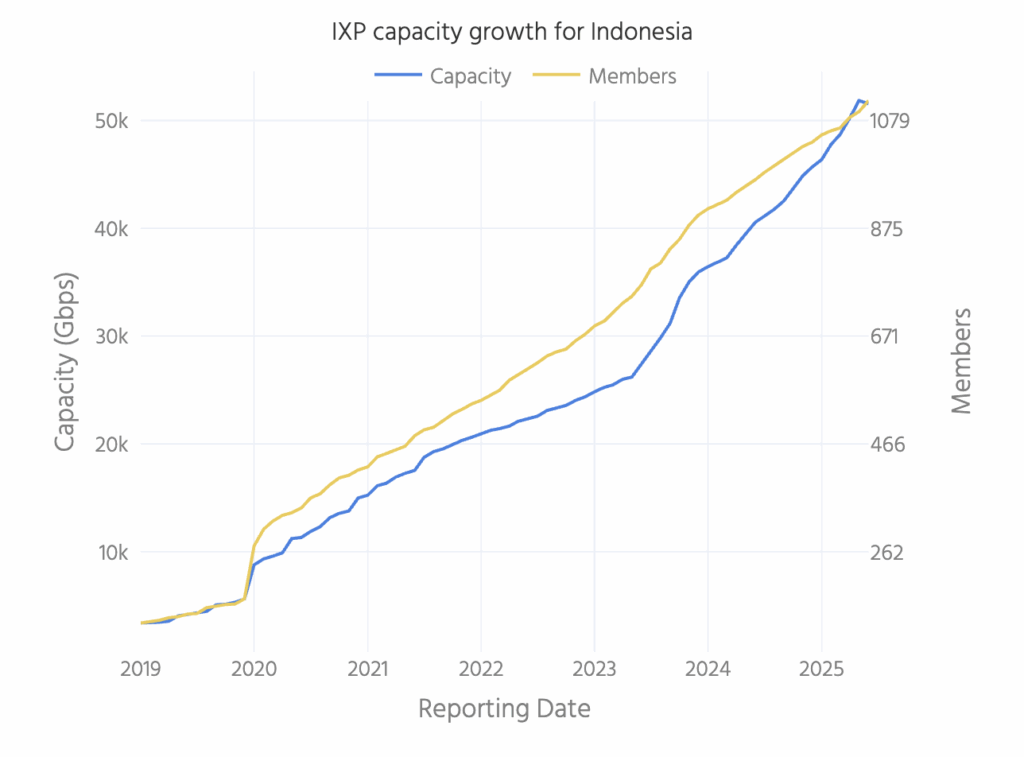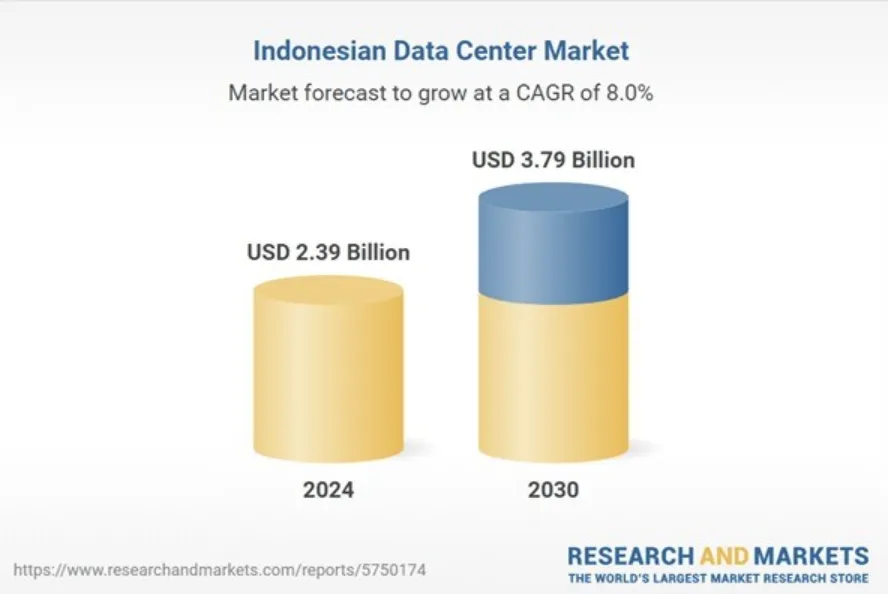Introduction
Indonesia’s digital economy is expanding rapidly; projected to reach $146 billion by 2025, making it Southeast Asia’s largest digital market. Key drivers include internet penetration, smartphone adoption, and strategic infrastructure investments. Central to this ecosystem are Internet Exchange Points (IXPs) and data centers, which boost digital capabilities, reduce costs, and spur innovation.
Internet Exchange Points: The Hidden Engine
An Internet Exchange Point is a physical and virtual infrastructure enabling networks—from ISPs and mobile carriers to content platforms and enterprise clouds—to exchange data directly. By hosting IXs inside advanced data centers, Indonesia leaps over its traditional geographic challenges, cutting down latency, boosting network reliability, and significantly lowering operational costs. By enabling millions of internet users in Indonesia to experience high-speed, low-latency connectivity—not only for entertainment and communication, but also for commercial purposes—Internet Exchange Points help drive the country’s economic and productivity growth. The presence of multiple Internet Exchange Points in Indonesia has a significant impact, particularly in strengthening the digital ecosystem.
The Impact of IXPs on Indonesia’s Digital Ecosystem

Source: https://pulse.internetsociety.org/en/ixp-tracker/?country_code=ID
The numbers speak volumes about Indonesia’s IX momentum:
IX Traffic Volumes
Internet exchanges in major cities like Jakarta and Surabaya have experienced double-digit year-over-year growth in daily peak traffic, with Jakarta alone witnessing IX traffic exceeding 2 Tbps by late 2024. Analysis suggests this growth mirrors the climbing adoption rates in video streaming, online gaming, and AI-driven services. The rapid growth of internet traffic in Indonesia is also supported by advancements in end-to-end network architecture and the availability of proper facilities in various data centers where Internet Exchanges are hosted.
Membership Expansion
The number of networks and platforms connected to local IXs has surged, reflecting not just ISP activity, but also a robust uptick in cloud platforms, regional startups, and content exchange nodes. As per industry reporting, Indonesia’s primary IX has seen membership grow by over 25% in the past two years with total 20 IXPs nationwide. The convenience and user-friendly nature of Internet Exchange facilities allows members to connect with each other easily, marking a significant expansion.
Edge and Regional IX Proliferation
The expansion into regional hubs outside Java—supported by joint ventures and regulatory backing—means high-speed interconnectivity now powers not just the capital but emerging markets across Sumatra, Kalimantan, and Sulawesi. This enables all peers—not just those in major interconnectivity hubs or big cities—to connect with local ISPs, allowing them to reach end users, or eyeballs, and deliver internet content more efficiently.
Industry Insights: Unlocking Digital Innovation in Indonesia
The strategic placement and rapid growth of IXs inside data centers drive an ecosystem where innovation flourishes:
Local Data Sovereignty: Keeping Data at Home
Decentralized data exchange through local IXPs enables Indonesian businesses and government institutions to keep sensitive data within national borders. This ensures greater control, aligns with regulatory requirements, and supports advanced workloads—such as AI-powered platforms for public services and e-government initiatives.
The momentum for local data hosting is further reinforced by the upcoming Personal Data Protection Bill, expected to be enacted in 2025. This regulation will mandate stricter compliance around data storage and handling, encouraging organizations to prioritize regional data sovereignty through local infrastructure.
De-risked Connectivity: Resilience in a Globalized Web
By moving more traffic onto local IXs, businesses remain resilient against global outages and international bandwidth shocks—a vital hedge as cybersecurity threats rise. As cybersecurity threats continue to rise, the ability to maintain stable, local routes for internet traffic becomes a critical defensive measure—minimizing latency, ensuring service continuity, and protecting user data integrity.
Economies of Scale
Internet penetration has surged past 212 million users. With approximately 74.6% of the population now online, local IXPs serve as a traffic aggregation hub, facilitating efficient data routing between networks, content providers, and service platforms.
This localization of traffic brings significant cost efficiencies to Internet Service Providers (ISPs) and Content Delivery Networks (CDNs), reducing international transit fees and operational overhead. These savings are passed on to consumers through lower prices, better service quality, and the proliferation of new digital services—from streaming platforms to fintech applications.
Smart City Synergy: Real-Time Urban Intelligence
High-performing IX infrastructure is also critical to the success of smart city programs and IoT (Internet of Things) deployments. Cities like Jakarta, Surabaya, and Bandung are integrating IXP capabilities into their urban digital frameworks, enabling real-time data exchange between transportation systems, utilities, public services, and citizen-facing apps.
By minimizing data transmission delays and maximizing network efficiency, IXPs ensure that smart city operations—from traffic control to emergency response—function seamlessly and responsively.
A Decentralized Digital Future
With these innovations and growing momentum, Indonesia stands at the forefront of building a resilient, inclusive, and locally empowered digital ecosystem. As more regions invest in IX infrastructure, the country moves closer to achieving equitable access, digital sovereignty, and economic growth for all.
Local IXPs aren’t just a technical necessity—they are a strategic asset driving Indonesia’s journey into the future.
Data Centers as Catalysts for Innovation

The hype of the data centers industry in Indonesia has finally shown in numbers. Below are the industry insights:
- From less than 10 data centers in 2018 to over 30 data centers in 2024.
- Investment in data center infrastructure reached $1.5 billion in 2023, with a projected CAGR of 8% through 2030.
- Major international cloud providers like Google and Amazon are investing $100 million+ each in local facilities.
With the current trends, the Indonesian government even aims to double the number of IXPs and expand data center capacity by 50% by 2030. Even the industry forecasts suggest that by 2030, over 50% of internet traffic will be within local data centers, further empowering AI and IoT solutions.
The Road Ahead: Transformation at Scale
Indonesia’s journey is just beginning. The proactive expansion of IXs, supported by forward-thinking policy and strong public-private partnerships, signals a new era of digital leadership. Key imperatives include:
- Scaling IX coverage to more remote areas, bridging urban-rural digital divides
- Deepening collaboration between hyperscale data centers and local ISPs
- Investing in next-gen connectivity (5G/edge computing) to support new classes of smart applications
Conclusion
IXs aren’t just technical infrastructure; they are nodes of possibility where Indonesia’s brightest ideas find their fastest routes. With every peer and data packet exchanged, Indonesia’s digital economy beats stronger—more innovative, resilient, and ready for the future. Business and public sector leaders alike should look to IX investments as critical levers for long-term success in Southeast Asia.
The strategic development of IXPs and data centers is key to unlocking Indonesia’s full digital potential. These infrastructures not only facilitate faster and more reliable internet but also enable local innovation, data sovereignty, and economic growth. Investing in these areas ensures Indonesia remains competitive and future-ready in the fast-evolving digital landscape.

Supporting Data Sources:
- McKinsey & Company, The Impact of Internet on Economic Growth (2016)
- RISI International, Internet Exchange: A Catalyst for Digital Economy (2020)
- U.S. Department of Commerce, Indonesia Digital Economy (2023)
- Indonesia Investment Coordinating Board, Data Center and Cloud Market Reports (2024)

